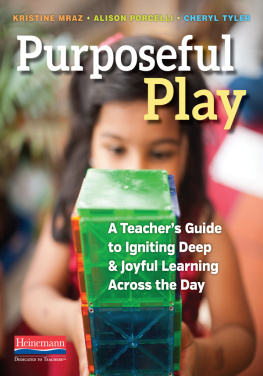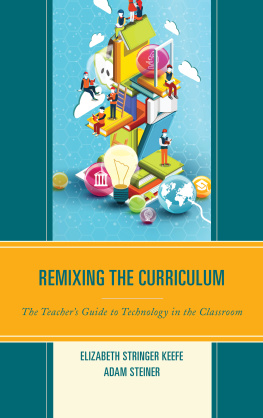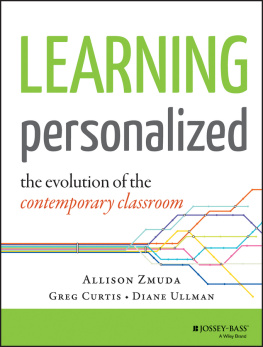

Published by Redleaf Press
10 Yorkton Court
St. Paul, MN 55117
www.redleafpress.org
2008 by Deb Curtis and Margie Carter
All rights reserved. Unless otherwise noted on a specific page, no portion of this publication may be reproduced or transmitted in any form or by any means, electronic or mechanical, including photocopying, recording, or capturing on any information storage and retrieval system, without permission in writing from the publisher, except by a reviewer, who may quote brief passages in a critical article or review to be printed in a magazine or newspaper, or electronically transmitted on radio, television, or the Internet.
First edition 2008
Cover design by Percolator
Cover photograph by LaTisha Pearson
Interior design by Percolator
Typeset in Utopia
In Appendix B, , curriculum and assessment statements are from Te Whriki; Kei Tua o te Pae by the New Zealand Ministry of Education (Wellington, New Zealand: Learning Media, 2006). 2006 by Crown. Reprinted with permission from Learning Media Limited.
Library of Congress Cataloging-in-Publication Data
Curtis, Deb.
Learning together with young children : a curriculum framework for reflective teachers / Deb Curtis and Margie Carter.1st ed.
p. cm.
Includes bibliographical references and index.
ISBN 978-1-60554-173-0 (e-book)
1. Early childhood educationUnited StatesCurricula. 2. Early childhood educationUnited StatesActivity programs. 3. Reflective teachingUnited States. I. Carter, Margie. II. Title.
LB1139.4.C876 2007
372.210973dc22
2007022589

Jocelyn (Barbarin) Myres 19512001
Jocelyns leadership in the early childhood field inspired us on many levels.
We first met her as a colleague doing community college field instruction in child care programs across the Seattle area. Wanting to be more closely involved with the lives of children, she took a job as a child care director, and a few years after that, returned to the classroom as a preschool teacher. Jocelyns unusual career path inspired Deb to return to work directly with children herself.
Jocelyn led by example. Her classroom is prominently featured in our video, Children at the Center: Reflective Teachers at Work. Through this window into her thoughts and actions, Jocelyn has inspired early childhood educators across the United States and Canada. Her untimely death is a tremendous loss to the Seattle early childhood community. Her memory and contributions live on as a powerful reminder for what is possible in our work with children and families.
Learning Together with Young Children
As always, our families and friends have been incredibly supportive of us during the writing of this book.
Our editor, Beth Wallace, supported us through difficult cuts in a manuscript that was far too long, and offered valuable feedback for the structure of the text.
The staff of Redleaf Press with whom we worked, particularly Sid Farrar, Ryan Scheife, Mara Miller, JoAnne Voltz, Laurie Herrmann, Emily Nesheim, and Tom Owen, were receptive and responsive to our perspectives. They had the challenging task of balancing our fierce advocacy for early childhood educators in the trenches with their publication guidelines, production standards, and marketing agendas. We appreciate the principles that guide Redleafs publishing efforts and their assurance of fair labor practices in this global economy where the only affordable way to produce a full-color book is to have it printed in a developing country.
Every book we write is a collaborative process, not only between the two of us, but also including a wide range of early childhood educators who generously welcome us into their lives, minds, family child care homes, classrooms, and program cultures. People contributed far more stories and photos than we were able to use in this book, but their contributions have made their way into our thinking and will no doubt appear as examples in the workshops, presentations, and consultations that are central to our professional lives. We are enormously grateful for the engagement and generosity extended to us across North America, Australia, New Zealand, and Italy.
We want to specifically acknowledge the following individuals and organizations and apologize for any unintended omissions:

 Evie Lieberman opened her home to us for our initial writing retreat to launch this book.
Evie Lieberman opened her home to us for our initial writing retreat to launch this book.

 Pauline Baker and the Tucson Childrens Project hosted a wonderful gathering of colleagues and loaned us a copy of The Power of Protocol: An Educators Guide to Better Practice by Joseph P. McDonald to stimulate our thinking.
Pauline Baker and the Tucson Childrens Project hosted a wonderful gathering of colleagues and loaned us a copy of The Power of Protocol: An Educators Guide to Better Practice by Joseph P. McDonald to stimulate our thinking.

 During that gathering, Teresa Acevedo thrilled us with her courageous act of resistance against bureaucratic mandates that would undermine her Head Start program.
During that gathering, Teresa Acevedo thrilled us with her courageous act of resistance against bureaucratic mandates that would undermine her Head Start program.

 During our year of writing, Tom Hunter sang and collaborated with us to come up with the concept of taking responsibility for living fully and teaching well.
During our year of writing, Tom Hunter sang and collaborated with us to come up with the concept of taking responsibility for living fully and teaching well.

 Ann Pelo, Kristin Brown, Cindy Hayertz, and Donna King let us interrupt their busy lives again and again with visits or requests to track down a relevant story, photo, or permission slip.
Ann Pelo, Kristin Brown, Cindy Hayertz, and Donna King let us interrupt their busy lives again and again with visits or requests to track down a relevant story, photo, or permission slip.

 Special thanks to Rukia Rogers, LaTisha Pearson, Elma Horton, and Michelle and Julie Garrett, who responded to our last-minute requests for photos.
Special thanks to Rukia Rogers, LaTisha Pearson, Elma Horton, and Michelle and Julie Garrett, who responded to our last-minute requests for photos.

 Children in all kinds of early childhood settings have welcomed us with open hearts and genuinely allowed us to learn alongside them.
Children in all kinds of early childhood settings have welcomed us with open hearts and genuinely allowed us to learn alongside them.

 We appreciate the following family providers, teachers, directors, and teacher educators who took time from their other commitments to answer questions and share experiences, observations, and a multitude of photographs:
We appreciate the following family providers, teachers, directors, and teacher educators who took time from their other commitments to answer questions and share experiences, observations, and a multitude of photographs:
in Australia: Jenny Dwyer, Trinity Preschool; Fran Bastion and Nicole Tytherleigh, Earlwood Childrens Centre; Diane Duvall, Lady Gowrie Child Centre, Gillian McAuliffe, Bold Park Community School
Next page







